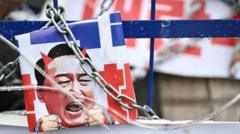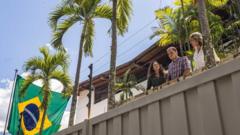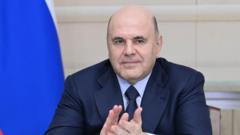With the expiration of Yoon Suk Yeol’s arrest warrant looming, South Korea is engulfed in a political crisis that has provoked both public protests and heightened security measures. Yoon’s attempts to impose martial law have sparked controversy, leading to a standoff with law enforcement as he remains fortified behind barricades. Investigators seeking to hold him accountable for charges relating to insurrection and abuse of power face significant obstacles, prompting both domestic and international implications.
**South Korea Faces Political Crisis as Impeached President Defies Arrest Attempts**

**South Korea Faces Political Crisis as Impeached President Defies Arrest Attempts**
As the deadline for an arrest warrant approaches, tensions rise around South Korea's suspended president Yoon Suk Yeol, who remains barricaded in his residence amid ongoing legal disputes.
The South Korean political landscape has reached an unprecedented crisis with ongoing efforts to arrest the suspended president Yoon Suk Yeol. Yoon, embattled in accusations of attempting to impose martial law, fortified his residence with barbed wire and buses to prevent investigators from executing an arrest warrant, which is set to expire imminently. This situation follows a six-hour standoff last week when law enforcement attempted to apprehend him.
Despite multiple demands for his appearance in court, Yoon's legal team argues that the warrants against him are unlawful, claiming a lack of authority by the investigating body. As public dissent grows, thousands of protesters have taken to the streets, confronting one another in support and opposition of the president, who has vowed to resist arrest and “fight to the end.”
The presidential security service has actively obstructed attempts to detain Yoon, citing his status as a sitting president until the constitutional court acts on his impeachment. Yoon's lawyers contend that he is effectively detained, while they seek legal recourse against the arrest initiative. With public emotion running high, calls for renewed action from law enforcement escalate, though prospects for a successful arrest remain uncertain.
Internationally, the turmoil poses complications for diplomatic relations, notably as U.S. Secretary of State Antony Blinken arrives in Seoul amidst the unrest. The U.S. had previously maintained strong support for Yoon’s administration, which has been critical in dealing with the challenges posed by North Korea and tensions with China. As the political situation unfolds, Blinken’s priority will be to reinforce stability and cooperation among South Korea, the U.S., and Japan, which might further be jeopardized by an impending presidential election later this year.
South Korea's democracy is now under the spotlight, facing tests similar to those seen in other global democracies. As the nation navigates the possible outcomes of Yoon's controversial leadership, analysts and citizens alike question the resilience of its political institutions and the future trajectory of its governance. The situation as it stands appears to be fluid, with both legal complexities and public sentiment likely to shape the next steps in this high-stakes political drama.
Despite multiple demands for his appearance in court, Yoon's legal team argues that the warrants against him are unlawful, claiming a lack of authority by the investigating body. As public dissent grows, thousands of protesters have taken to the streets, confronting one another in support and opposition of the president, who has vowed to resist arrest and “fight to the end.”
The presidential security service has actively obstructed attempts to detain Yoon, citing his status as a sitting president until the constitutional court acts on his impeachment. Yoon's lawyers contend that he is effectively detained, while they seek legal recourse against the arrest initiative. With public emotion running high, calls for renewed action from law enforcement escalate, though prospects for a successful arrest remain uncertain.
Internationally, the turmoil poses complications for diplomatic relations, notably as U.S. Secretary of State Antony Blinken arrives in Seoul amidst the unrest. The U.S. had previously maintained strong support for Yoon’s administration, which has been critical in dealing with the challenges posed by North Korea and tensions with China. As the political situation unfolds, Blinken’s priority will be to reinforce stability and cooperation among South Korea, the U.S., and Japan, which might further be jeopardized by an impending presidential election later this year.
South Korea's democracy is now under the spotlight, facing tests similar to those seen in other global democracies. As the nation navigates the possible outcomes of Yoon's controversial leadership, analysts and citizens alike question the resilience of its political institutions and the future trajectory of its governance. The situation as it stands appears to be fluid, with both legal complexities and public sentiment likely to shape the next steps in this high-stakes political drama.


















